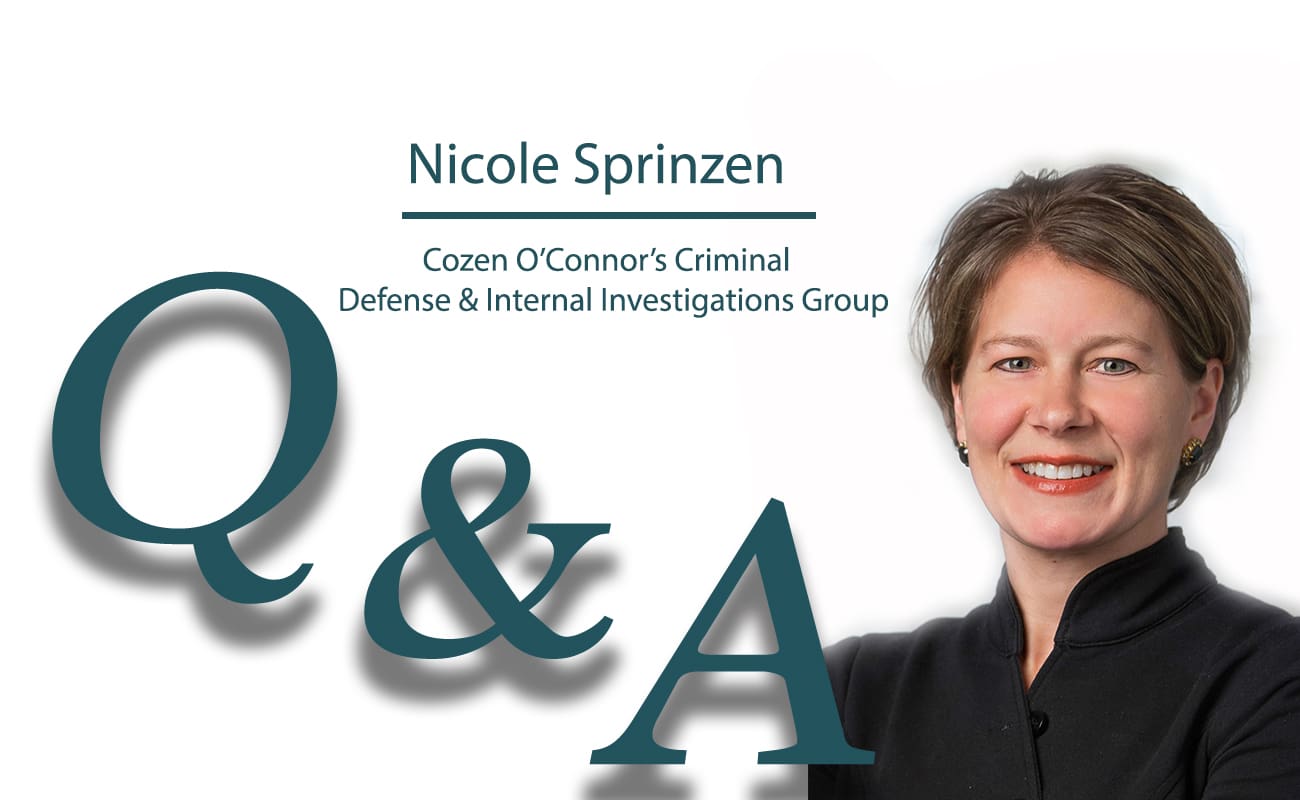Q&A with Nicole Sprinzen of Cozen O’Connor
With the U.S. Supreme Court’s decision in Murphy v. NCAA on May 14, 2018, the legal landscape for sports gambling and many other types of betting-based businesses changed dramatically. Although these types of businesses are now permitted where they may have been prohibited in the past, opening the floodgates for entrepreneurial endeavors in this space does not come without legal restriction. Many of these new businesses are already subject to anti-money laundering (AML) laws and regulations, or may be in the future with new laws that can be expected.
The holding of the Murphy case was narrow, but its impact is broad. In its decision, the Supreme Court overturned the Professional and Amateur Sports Protection Act of 1992 (PASPA). PASPA made it unlawful for states to license and either states or private individuals to sponsor, operate, advertise or promote sports gambling. States that had allowed gambling businesses as of the date of its enactment or within a specified time frame after its passage were grandfathered, but laws allowing gambling businesses after that were prohibited. Effectively, PASPA operated to maintain the status quo, leaving Nevada as the only venue for legal sports gambling, and there only in casinos.
Leading to the litigation underlying the Murphy decision, the State of New Jersey sought to repeal a state law prohibiting sports gambling in casinos and horseracing tracks, but was prevented from doing so by PASPA. In a 6-3 decision, the Court found that PASPA violated the 10th Amendment’s anticommandeering principle by commanding the states to not act. Previously, the principle had only been applied when the federal government forced state governments to affirmatively act. The Court’s decision in Murphy expanded the principle to apply whenever the federal government gives restrictive orders to state legislatures.
Q: After Murphy, what kinds of new sports betting businesses can be expected to open?
A: With the repeal of PASPA, states are empowered to regulate intrastate sports gambling as they see fit, including allowing new gambling ventures. States may now permit sports gambling in casinos and horseracing tracks, and in more creative venues including in standalone sports books, restaurants, convenience stores or other locations. The door is also open to new types of betting; for example, if entity betting is allowed, hedge funds and investment firms may be permitted to place sports bets. Under this new regulatory landscape, states and their citizens have the opportunity to tap into new revenue sources.
Q: Are there restrictions regarding what kinds of sports betting businesses can operate after Murphy?
A: Yes. Murphy did not preclude the federal government from being able to legislate state-level activity. Congress can still enact federal legislation that prohibits certain conduct, can regulate state activity that affects interstate commerce through the Commerce Clause and can encourage states to adopt federal policies through incentive legislation (e.g., the federal government’s offer of highway construction funding to states in return for their adoption of a drinking age of 21). For example, despite the new wide-open landscape, business entrepreneurs should be mindful that the Federal Wire Act, 18 U.S.C. § 1084, prohibits the sending of bets or information that aids betting over interstate wire unless both the originating and receiving state legalize betting activity. This restriction, at least in its current form, may limit the viability of online betting rooms and other betting forums that would receive bets by electronic wire or telephone.
Q: What are the compliance risks that come with these new business opportunities?
A: With all these new business opportunities comes business risk. One significant risk that comes hand-in-hand with gambling ventures is money laundering, including in relation to terrorism financing. The ability of customers to exchange money, obtain credit and engage in transactions involving the exchange of monetary instruments increases the opportunity for those outlets to be used for illicit purposes. Thomas Ott, the Associate Director of Enforcement for the U.S. Treasury Department’s Financial Crimes Enforcement Network (FinCEN), which is the only anti-money laundering regulator of casinos, said in an August 2016 speech at a casino conference in Las Vegas, Nevada that “due to their cash-intensive nature, casinos and card clubs have historically been susceptible to abuse by certain criminal actors.”[1]
Q: Are any of these businesses already subject to anti-money laundering requirements?
A: Casinos that already have sports gambling are already subject to AML compliance laws and regulations. The Bank Secrecy Act (BSA) and the regulations adopted thereunder impose extensive AML compliance requirements on all kinds of financial institutions. FinCEN regulations define casinos that have gross annual gaming revenue of more than $1 million as “financial institutions” that are subject to these and other casino-specific requirements.
Covered casinos and their sports books are required to have a risk-based compliance program in place. A risk-based program identifies the business’s money laundering risk in light of the type of products and services the business offers, the locations it serves and the nature of its customers and implements policies and procedures designed to mitigate those risks. The program must include:
- Compliance with recordkeeping requirements and maintenance of records for five years
- Implementation of customer identity verification (for transactions over $3,000) and currency reporting (cash or currency transactions over $10,000) requirements
- Suspicious activity monitoring and reporting
- Compliance with recordkeeping requirements for financial institutions (e.g., maintaining records of transactions involving foreign accounts) and casino-specific requirements (e.g., maintaining copies of records relating to each deposit of funds, account opened or line of credit extended)
- Program testing with a scope and frequency determined by the business’s risk profile
- Ongoing employee compliance training and compliance program documentation
Q: Will new sports books and new types of gambling businesses be subject to the AML requirements?
A: For casinos that are already subject to AML compliance and recordkeeping requirements, the addition of a sports book following the Murphy decision is likely to have minimal impact on operations as usual. Sports gambling desks will follow the same compliance requirements that are already in place in the casinos in which they are located. For casinos that are not subject to the regulations because they are under the $1 million threshold, the addition of a sports book may trigger AML requirements.
On the other hand, non-casino betting businesses, like horse racing, dog racing, bingo and jai alai, that do not currently offer casino games are not required to comply with AML laws and regulations because they involve what is referred to as pari-mutuel betting, not gambling. In those betting operations, the house takes its fees and cut of the bets off the top, and then the betting participants receive the remainder of the pot in winnings. Although FinCEN recognizes that these operations pose law enforcement, tax compliance and money laundering risk, its compliance scheme is premised on the recognition that those risks are different than those for businesses offering full-scale casino operations. Without further regulation, sports books added to these businesses will not bring them within AML requirements.
Q: Are there changes in anti-money laundering compliance that we can expect to see?
A: With the enactment of new state laws that permit sports gambling and new types of gambling businesses and locations, it should be anticipated that new regulations will follow. Then-Director Jennifer Shasky Calvery said at a June 2014 conference focused on the BSA that “casinos are not simple cash intensive businesses … they are complex financial institutions with intricate operations that extend credit and that conduct millions of dollars of transactions every day … casinos can serve as the vehicle for the use, movement and concealment of ill-gotten gains; this is a risk inherent in all financial institutions.”[2] Similarly, sports gambling operates through financial transactions that can involve cash, the extension of credit or other financial tender, that can involve considerable value and that can result in bets placed on behalf of unidentified third parties.
Offering sports gambling in businesses or formats that have not historically been able to offer it will bring these risks to bear in new ways. If states expand sports gambling outside of casinos and into restaurants or convenience stores, for example, those businesses will be exposed to a significant type of risk that they have never experienced before in the nature of money laundering. Conceivably, particularly in online betting platforms, Bitcoin, which itself is commonly recognized as engendering increased money laundering risk for the anonymity it offers, at some point will be accepted for sports bets, adding additional challenges in tracing funds. The extension of current AML law to cover these new formats and opportunities should be expected, which would be most easily accomplished by bringing them within the definition of “financial institution” or “casino.”
Q: Does Murphy change a casino’s relationship with its bank, given AML requirements?
A: As covered financial institutions, federally insured or chartered banks are already subject to AML laws and regulations. They are required to have risk-based compliance programs in place, implement and follow a Know Your Customer program, engage in suspicious activity monitoring and comply with specific reporting requirements. To the extent that a casino is already subject to AML requirements, the addition of a sports betting operation in the casino likely will not change the casino’s relationship with its bank to any significant extent.
Although in the wake of Murphy, banks will likely (and should) review their compliance programs and ensure that they are giving adequate scrutiny to casino and gaming transactions, the businesses already will be subject to Know Your Customer and transactional monitoring by the bank. The additional sports gaming activity will fall within the existing due diligence and monitoring framework. For businesses new to sports betting, however, some banks may proactively subject them to their existing compliance policies and procedures for casinos before changes in the law require it. At a minimum, that increased scrutiny can be expected at some point.
Q: What tips do you have for compliance professionals in the gaming industry in light of the Murphy decision?
A: In writing for the majority in Murphy, Justice Alito noted that there is an interest in states legalizing gambling because it will weaken the black market for sports betting, which is frequently connected to organized crime.[3] With the legalization will come compliance requirements, which will mitigate terrorist financing, disguise of drug proceeds and other money laundering activity in these operations.
Compliance professionals working with casinos or other businesses that anticipate taking advantage of the new business opportunities that Murphy presents should consider thinking about compliance now as an integral part of operations design, rather than waiting until the inevitable statutory or regulatory changes that require compliance. The handling of advertising, information facilitating betting and the placement/receipt of bets must comply with existing laws prohibiting these activities over interstate wire.
Core AML compliance concepts like risk assessment, customer due diligence and training similarly are easiest to devise and implement at the stage when a business concept is in the development stages and before operations begin. When they are designed into a business’s everyday procedures, basic compliance procedures like requesting the source of a customer’s funds over a certain threshold level or requesting and confirming identification, are easily learned and followed.
[1] Prepared Remarks of FinCEN Associate Director for Enforcement Thomas Ott, delivered at the National Title 31 Suspicious Activity & Risk Assessment Conference and Expo, Las Vegas, NV, Aug. 17, 2016, available at www.fincen.gov.
[2] Prepared Remarks of Jennifer Shasky Calvery, Director, Financial Crimes Enforcement Network, 2014 Bank Secrecy Act Conference, Las Vegas, NV, June 12, 2014, available at www.fincen.gov.
[3] Murphy v. NCAA, Case No. 16-476, 584 U.S. ___, at 30 (May 14, 2018).










